Understanding Constitutional Statutes in the UK Constitution: An Essay
VerifiedAdded on 2022/12/09
|5
|938
|400
Essay
AI Summary
This essay provides a comprehensive examination of constitutional statutes within the context of the UK constitution. It begins by defining constitutional law and its sources, including statute law, common law, and conventions. The main body of the essay focuses on the concept of constitutional statutes, differentiating them from ordinary statutes and highlighting their significance in establishing the relationship between citizens and the state. The essay discusses the special treatment constitutional statutes receive in court, making it harder to repeal them by implication. Examples of constitutional statutes, such as the Bill of Rights 1688 and the Human Rights Act 1998, are provided. The essay also explores criticisms of constitutional statutes, particularly their vague definition and potential challenges to parliamentary sovereignty. The conclusion summarizes the key points, emphasizing the role and impact of constitutional statutes within the UK's uncodified constitution.
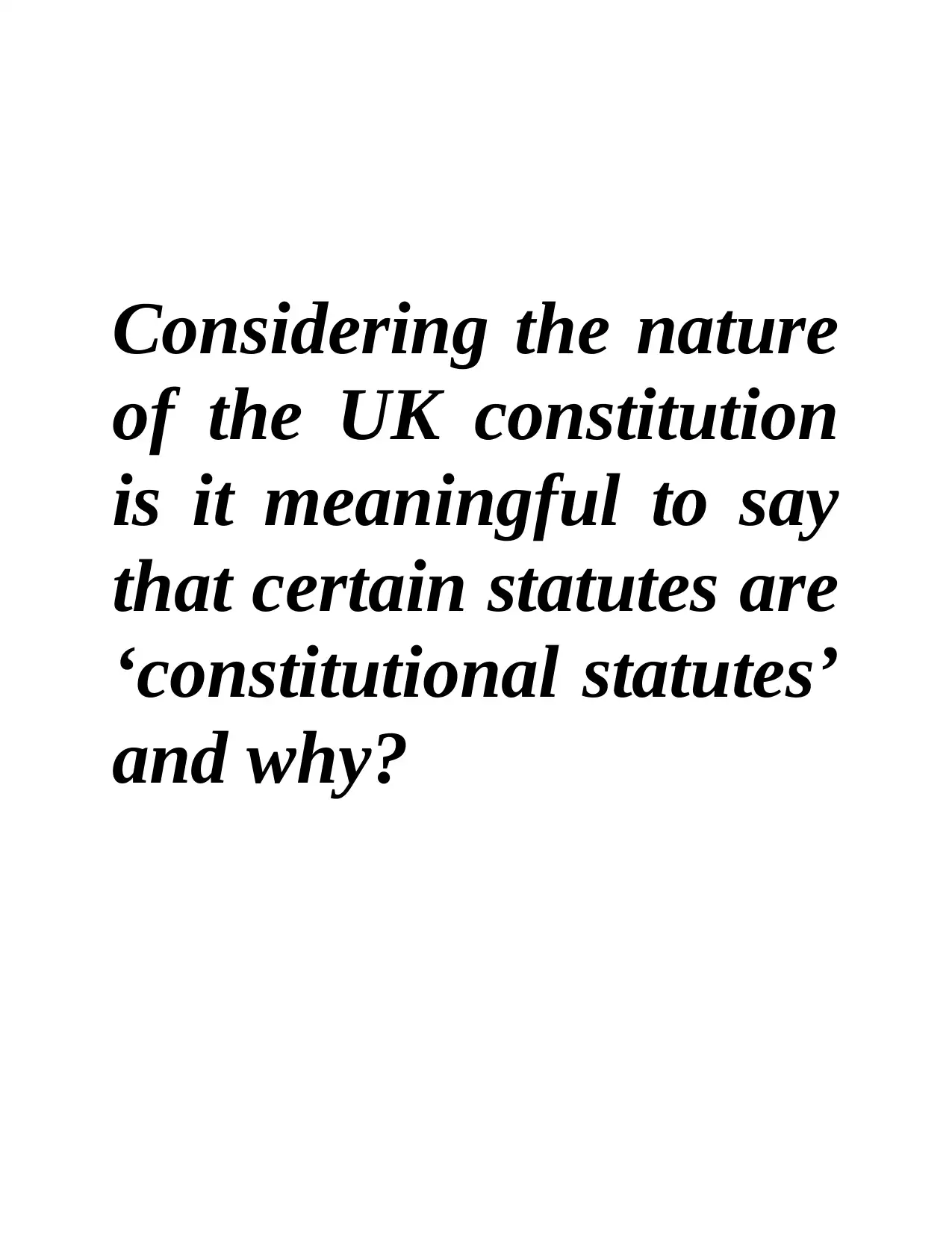
Considering the nature
of the UK constitution
is it meaningful to say
that certain statutes are
‘constitutional statutes’
and why?
of the UK constitution
is it meaningful to say
that certain statutes are
‘constitutional statutes’
and why?
Paraphrase This Document
Need a fresh take? Get an instant paraphrase of this document with our AI Paraphraser
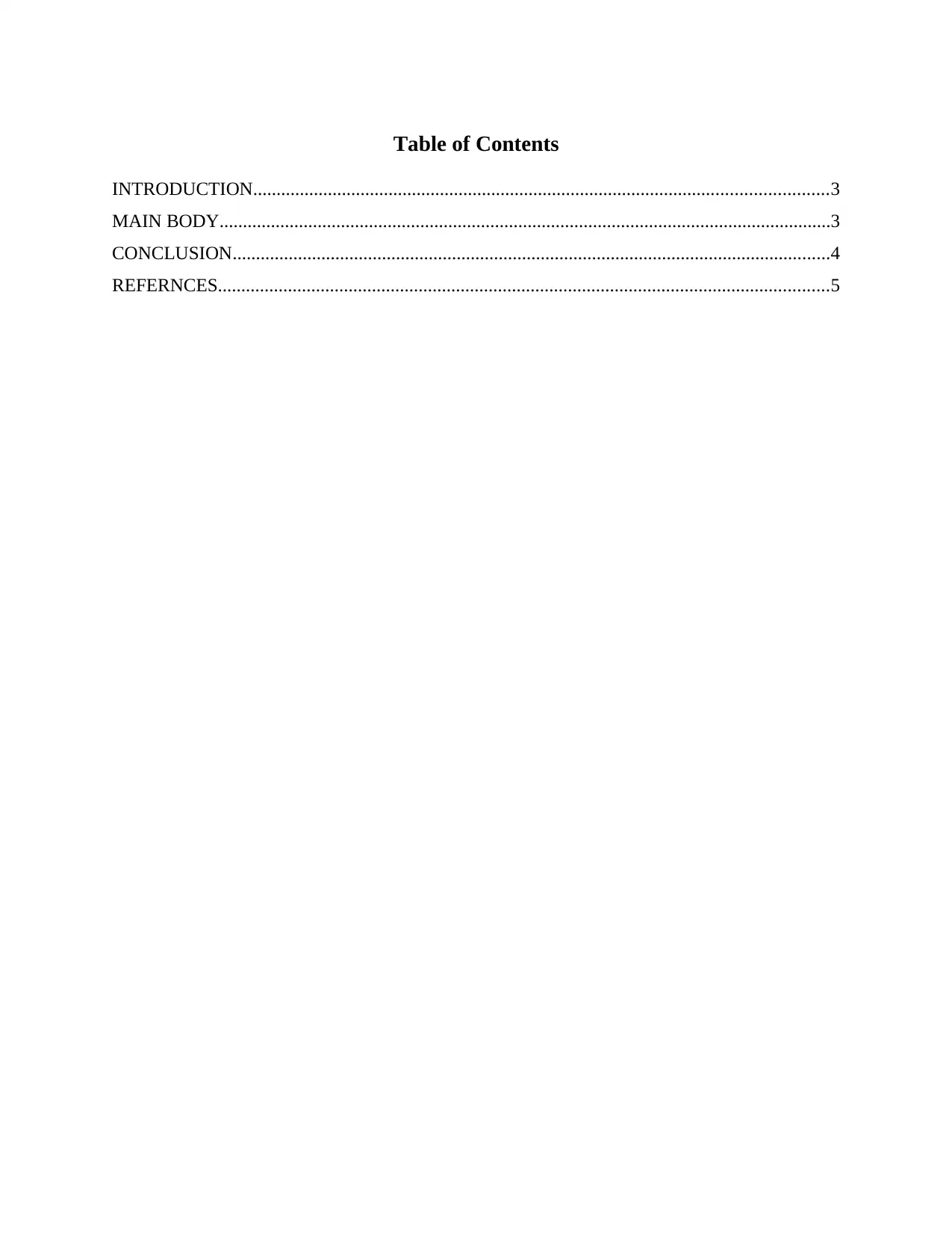
Table of Contents
INTRODUCTION...........................................................................................................................3
MAIN BODY...................................................................................................................................3
CONCLUSION................................................................................................................................4
REFERNCES...................................................................................................................................5
INTRODUCTION...........................................................................................................................3
MAIN BODY...................................................................................................................................3
CONCLUSION................................................................................................................................4
REFERNCES...................................................................................................................................5
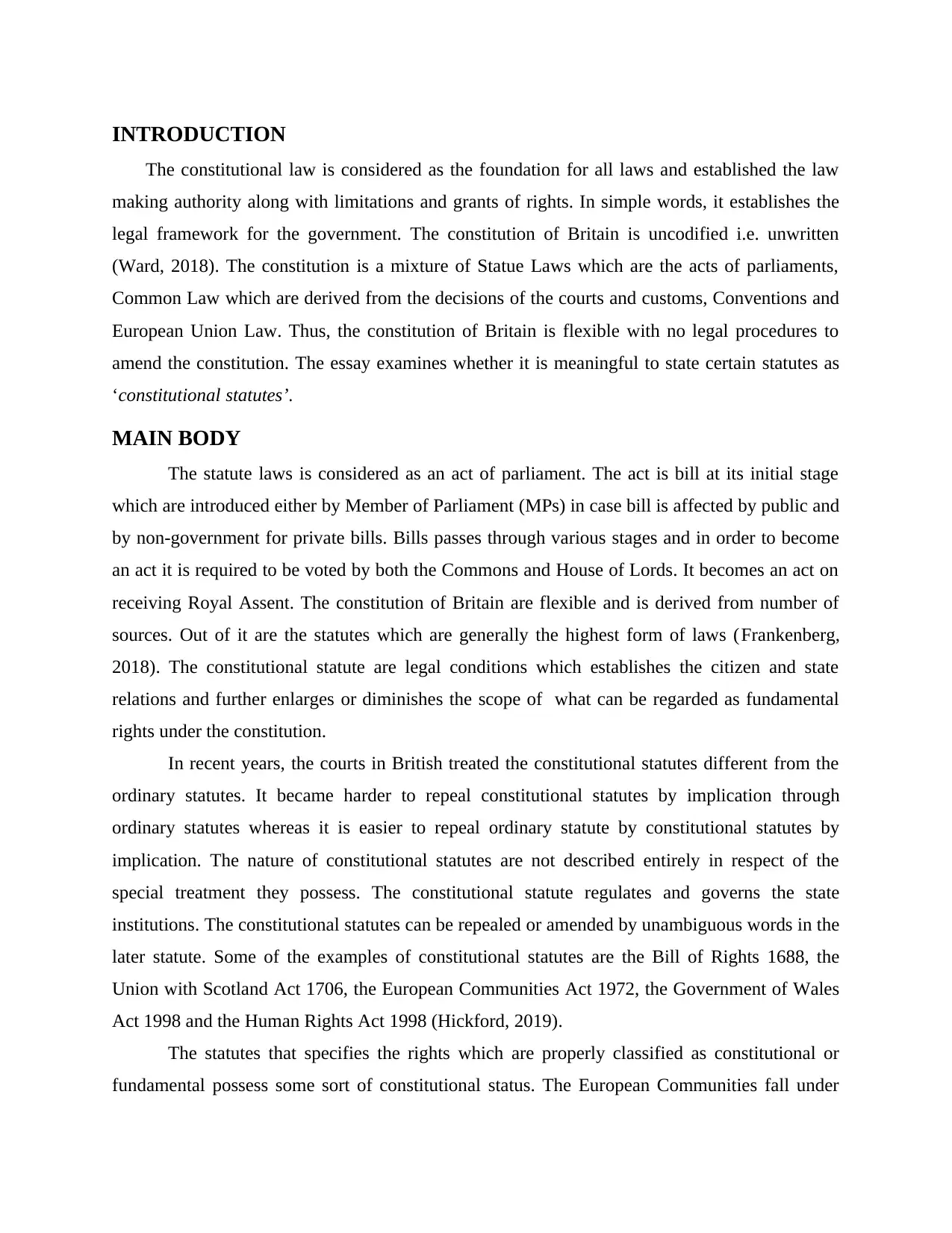
INTRODUCTION
The constitutional law is considered as the foundation for all laws and established the law
making authority along with limitations and grants of rights. In simple words, it establishes the
legal framework for the government. The constitution of Britain is uncodified i.e. unwritten
(Ward, 2018). The constitution is a mixture of Statue Laws which are the acts of parliaments,
Common Law which are derived from the decisions of the courts and customs, Conventions and
European Union Law. Thus, the constitution of Britain is flexible with no legal procedures to
amend the constitution. The essay examines whether it is meaningful to state certain statutes as
‘constitutional statutes’.
MAIN BODY
The statute laws is considered as an act of parliament. The act is bill at its initial stage
which are introduced either by Member of Parliament (MPs) in case bill is affected by public and
by non-government for private bills. Bills passes through various stages and in order to become
an act it is required to be voted by both the Commons and House of Lords. It becomes an act on
receiving Royal Assent. The constitution of Britain are flexible and is derived from number of
sources. Out of it are the statutes which are generally the highest form of laws (Frankenberg,
2018). The constitutional statute are legal conditions which establishes the citizen and state
relations and further enlarges or diminishes the scope of what can be regarded as fundamental
rights under the constitution.
In recent years, the courts in British treated the constitutional statutes different from the
ordinary statutes. It became harder to repeal constitutional statutes by implication through
ordinary statutes whereas it is easier to repeal ordinary statute by constitutional statutes by
implication. The nature of constitutional statutes are not described entirely in respect of the
special treatment they possess. The constitutional statute regulates and governs the state
institutions. The constitutional statutes can be repealed or amended by unambiguous words in the
later statute. Some of the examples of constitutional statutes are the Bill of Rights 1688, the
Union with Scotland Act 1706, the European Communities Act 1972, the Government of Wales
Act 1998 and the Human Rights Act 1998 (Hickford, 2019).
The statutes that specifies the rights which are properly classified as constitutional or
fundamental possess some sort of constitutional status. The European Communities fall under
The constitutional law is considered as the foundation for all laws and established the law
making authority along with limitations and grants of rights. In simple words, it establishes the
legal framework for the government. The constitution of Britain is uncodified i.e. unwritten
(Ward, 2018). The constitution is a mixture of Statue Laws which are the acts of parliaments,
Common Law which are derived from the decisions of the courts and customs, Conventions and
European Union Law. Thus, the constitution of Britain is flexible with no legal procedures to
amend the constitution. The essay examines whether it is meaningful to state certain statutes as
‘constitutional statutes’.
MAIN BODY
The statute laws is considered as an act of parliament. The act is bill at its initial stage
which are introduced either by Member of Parliament (MPs) in case bill is affected by public and
by non-government for private bills. Bills passes through various stages and in order to become
an act it is required to be voted by both the Commons and House of Lords. It becomes an act on
receiving Royal Assent. The constitution of Britain are flexible and is derived from number of
sources. Out of it are the statutes which are generally the highest form of laws (Frankenberg,
2018). The constitutional statute are legal conditions which establishes the citizen and state
relations and further enlarges or diminishes the scope of what can be regarded as fundamental
rights under the constitution.
In recent years, the courts in British treated the constitutional statutes different from the
ordinary statutes. It became harder to repeal constitutional statutes by implication through
ordinary statutes whereas it is easier to repeal ordinary statute by constitutional statutes by
implication. The nature of constitutional statutes are not described entirely in respect of the
special treatment they possess. The constitutional statute regulates and governs the state
institutions. The constitutional statutes can be repealed or amended by unambiguous words in the
later statute. Some of the examples of constitutional statutes are the Bill of Rights 1688, the
Union with Scotland Act 1706, the European Communities Act 1972, the Government of Wales
Act 1998 and the Human Rights Act 1998 (Hickford, 2019).
The statutes that specifies the rights which are properly classified as constitutional or
fundamental possess some sort of constitutional status. The European Communities fall under
⊘ This is a preview!⊘
Do you want full access?
Subscribe today to unlock all pages.

Trusted by 1+ million students worldwide
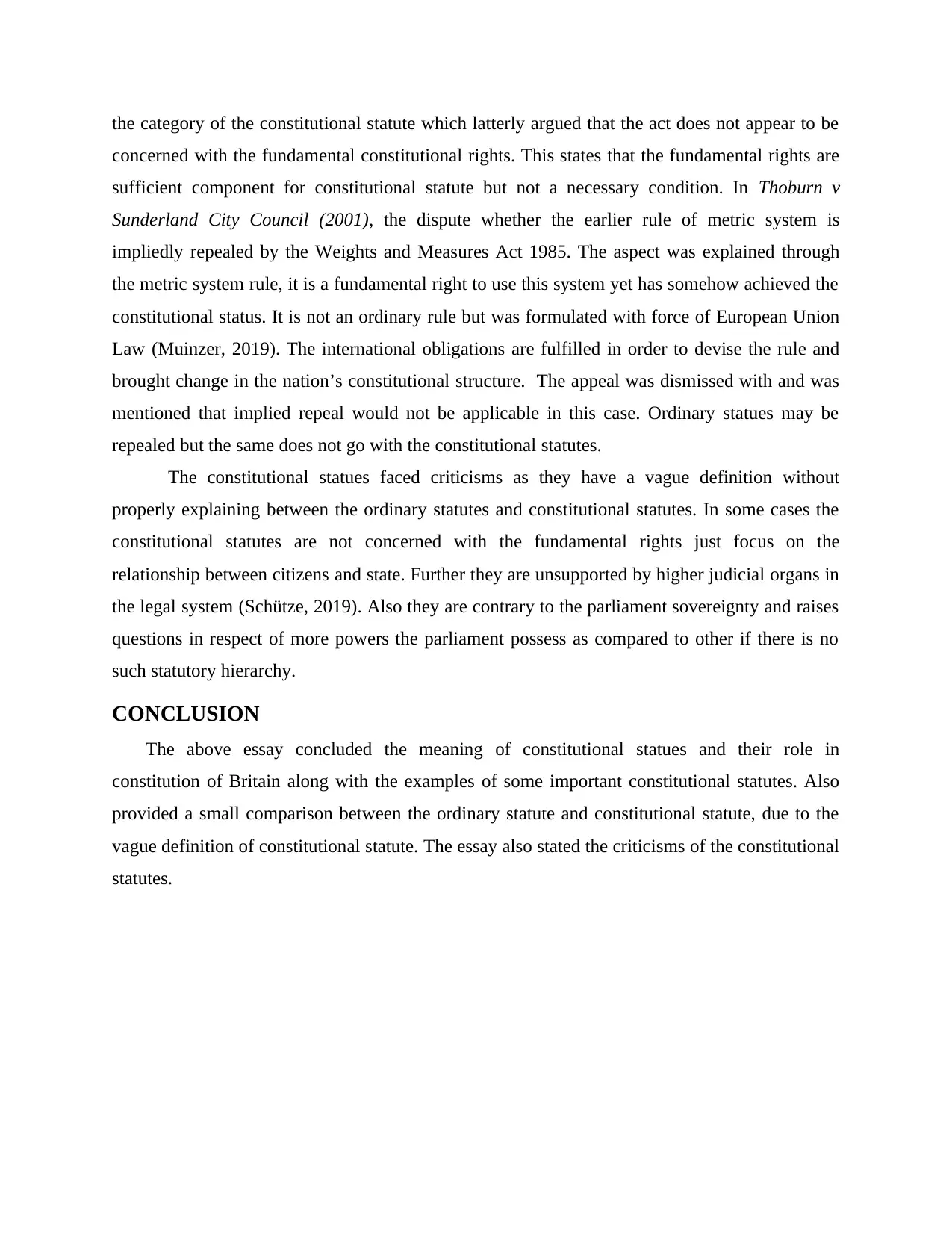
the category of the constitutional statute which latterly argued that the act does not appear to be
concerned with the fundamental constitutional rights. This states that the fundamental rights are
sufficient component for constitutional statute but not a necessary condition. In Thoburn v
Sunderland City Council (2001), the dispute whether the earlier rule of metric system is
impliedly repealed by the Weights and Measures Act 1985. The aspect was explained through
the metric system rule, it is a fundamental right to use this system yet has somehow achieved the
constitutional status. It is not an ordinary rule but was formulated with force of European Union
Law (Muinzer, 2019). The international obligations are fulfilled in order to devise the rule and
brought change in the nation’s constitutional structure. The appeal was dismissed with and was
mentioned that implied repeal would not be applicable in this case. Ordinary statues may be
repealed but the same does not go with the constitutional statutes.
The constitutional statues faced criticisms as they have a vague definition without
properly explaining between the ordinary statutes and constitutional statutes. In some cases the
constitutional statutes are not concerned with the fundamental rights just focus on the
relationship between citizens and state. Further they are unsupported by higher judicial organs in
the legal system (Schütze, 2019). Also they are contrary to the parliament sovereignty and raises
questions in respect of more powers the parliament possess as compared to other if there is no
such statutory hierarchy.
CONCLUSION
The above essay concluded the meaning of constitutional statues and their role in
constitution of Britain along with the examples of some important constitutional statutes. Also
provided a small comparison between the ordinary statute and constitutional statute, due to the
vague definition of constitutional statute. The essay also stated the criticisms of the constitutional
statutes.
concerned with the fundamental constitutional rights. This states that the fundamental rights are
sufficient component for constitutional statute but not a necessary condition. In Thoburn v
Sunderland City Council (2001), the dispute whether the earlier rule of metric system is
impliedly repealed by the Weights and Measures Act 1985. The aspect was explained through
the metric system rule, it is a fundamental right to use this system yet has somehow achieved the
constitutional status. It is not an ordinary rule but was formulated with force of European Union
Law (Muinzer, 2019). The international obligations are fulfilled in order to devise the rule and
brought change in the nation’s constitutional structure. The appeal was dismissed with and was
mentioned that implied repeal would not be applicable in this case. Ordinary statues may be
repealed but the same does not go with the constitutional statutes.
The constitutional statues faced criticisms as they have a vague definition without
properly explaining between the ordinary statutes and constitutional statutes. In some cases the
constitutional statutes are not concerned with the fundamental rights just focus on the
relationship between citizens and state. Further they are unsupported by higher judicial organs in
the legal system (Schütze, 2019). Also they are contrary to the parliament sovereignty and raises
questions in respect of more powers the parliament possess as compared to other if there is no
such statutory hierarchy.
CONCLUSION
The above essay concluded the meaning of constitutional statues and their role in
constitution of Britain along with the examples of some important constitutional statutes. Also
provided a small comparison between the ordinary statute and constitutional statute, due to the
vague definition of constitutional statute. The essay also stated the criticisms of the constitutional
statutes.
Paraphrase This Document
Need a fresh take? Get an instant paraphrase of this document with our AI Paraphraser
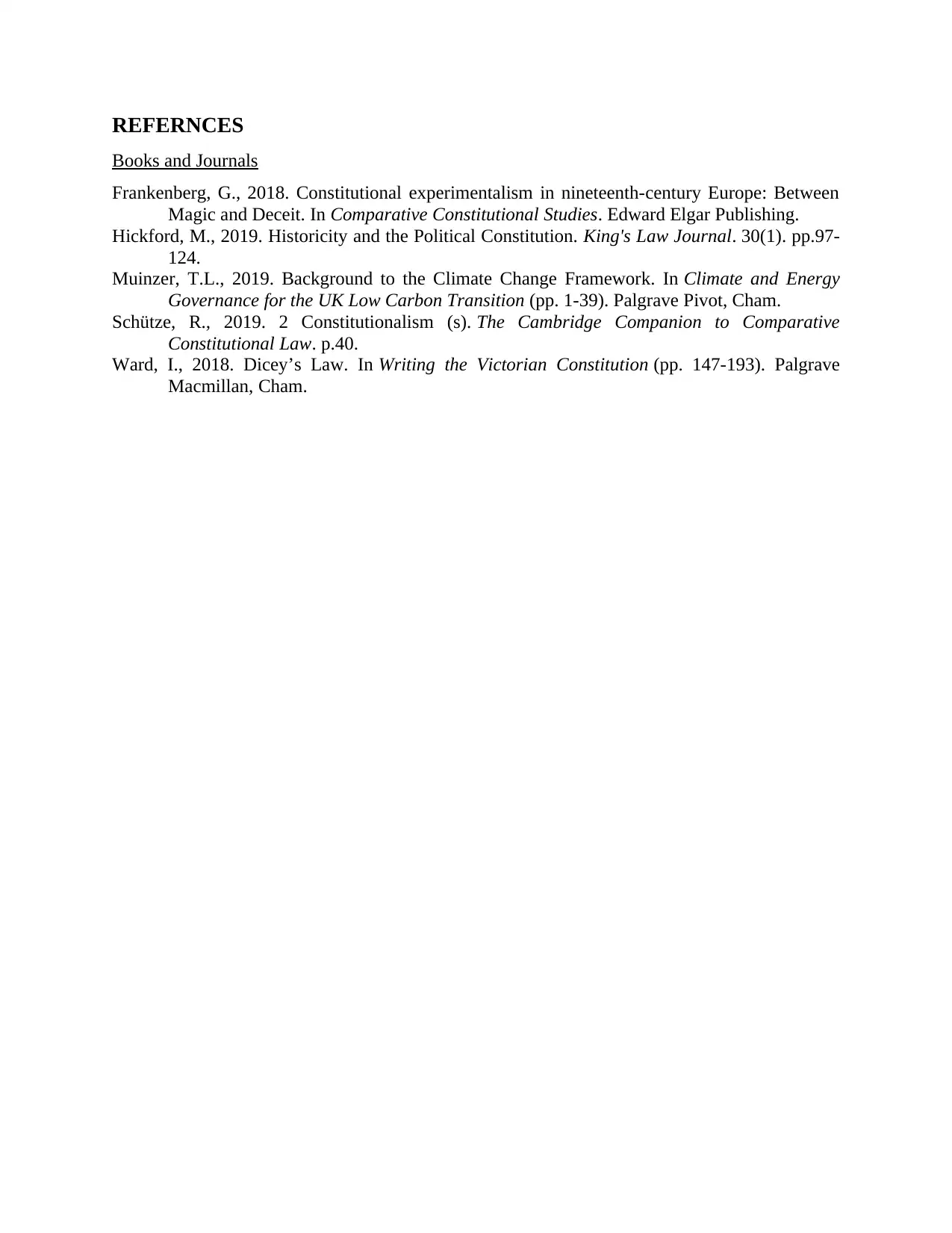
REFERNCES
Books and Journals
Frankenberg, G., 2018. Constitutional experimentalism in nineteenth-century Europe: Between
Magic and Deceit. In Comparative Constitutional Studies. Edward Elgar Publishing.
Hickford, M., 2019. Historicity and the Political Constitution. King's Law Journal. 30(1). pp.97-
124.
Muinzer, T.L., 2019. Background to the Climate Change Framework. In Climate and Energy
Governance for the UK Low Carbon Transition (pp. 1-39). Palgrave Pivot, Cham.
Schütze, R., 2019. 2 Constitutionalism (s). The Cambridge Companion to Comparative
Constitutional Law. p.40.
Ward, I., 2018. Dicey’s Law. In Writing the Victorian Constitution (pp. 147-193). Palgrave
Macmillan, Cham.
Books and Journals
Frankenberg, G., 2018. Constitutional experimentalism in nineteenth-century Europe: Between
Magic and Deceit. In Comparative Constitutional Studies. Edward Elgar Publishing.
Hickford, M., 2019. Historicity and the Political Constitution. King's Law Journal. 30(1). pp.97-
124.
Muinzer, T.L., 2019. Background to the Climate Change Framework. In Climate and Energy
Governance for the UK Low Carbon Transition (pp. 1-39). Palgrave Pivot, Cham.
Schütze, R., 2019. 2 Constitutionalism (s). The Cambridge Companion to Comparative
Constitutional Law. p.40.
Ward, I., 2018. Dicey’s Law. In Writing the Victorian Constitution (pp. 147-193). Palgrave
Macmillan, Cham.
1 out of 5
Related Documents
Your All-in-One AI-Powered Toolkit for Academic Success.
+13062052269
info@desklib.com
Available 24*7 on WhatsApp / Email
![[object Object]](/_next/static/media/star-bottom.7253800d.svg)
Unlock your academic potential
Copyright © 2020–2025 A2Z Services. All Rights Reserved. Developed and managed by ZUCOL.





